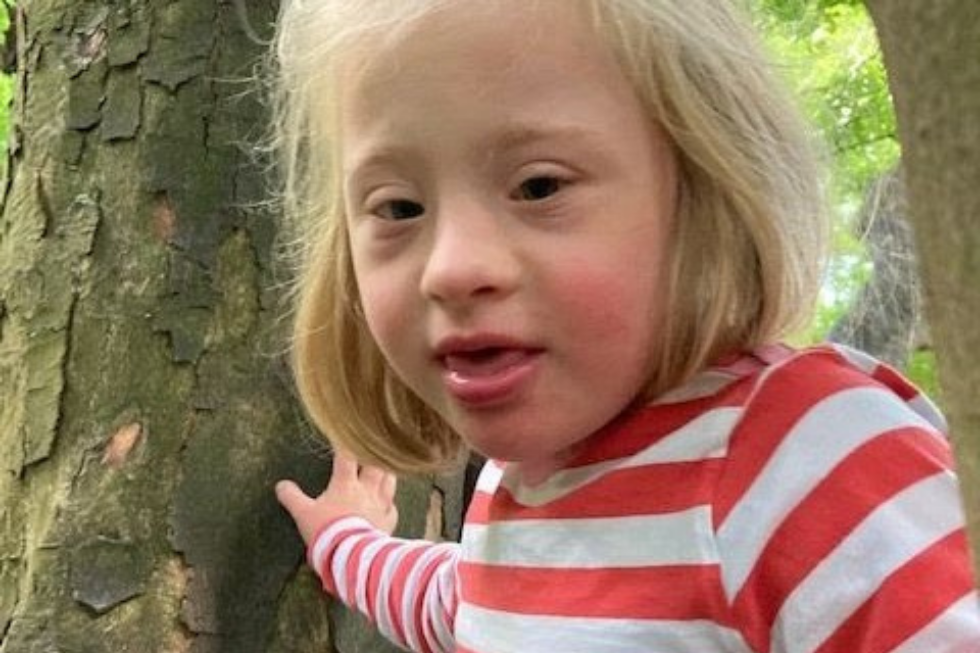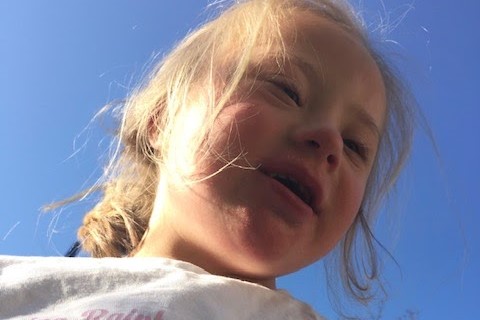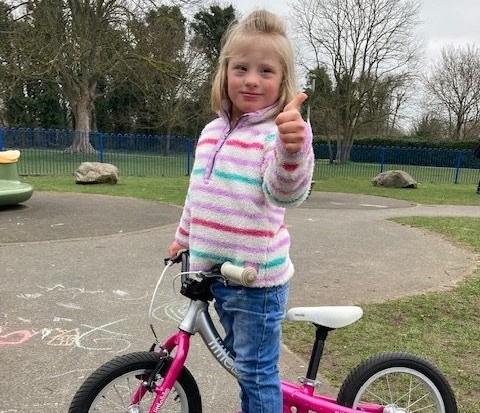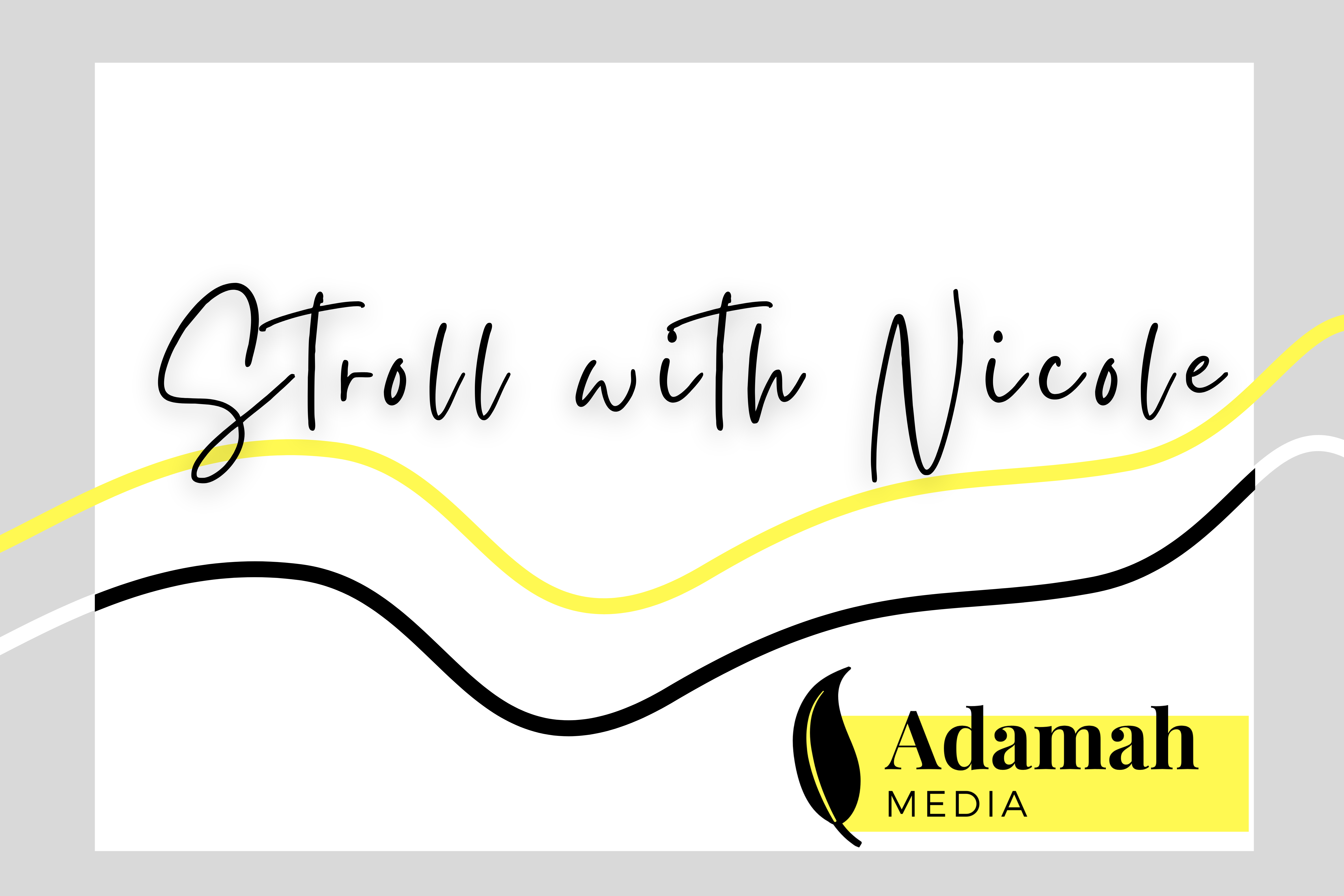
Perfection comes in all shapes and sizes …
Sarah Costerton offers a powerful insight into the joys and challenges of welcoming a child with Down syndrome into the family.
My daughter Beth made her acting debut in the ‘Call The Midwife’ Christmas Special, playing the part of Mandy – a little girl with Down syndrome living in an institution in the 1960’s. We recorded the episode, with a full cast performing, back in May 2018 and had such a great time celebrating Christmas traditions in the warm spring sunshine.
While it was exciting and fun, I felt quite emotional watching Beth on set, knowing that if she had been born a few decades earlier her life chances and experiences would have been so different to what she enjoys today. Indeed, she would have been lucky to have lived much past her 10th birthday.
But while children with Down syndrome have more opportunities than the pioneers who went before them, the pressure now is to prevent their birth. Ever more sophisticated ways of identifying unborn babies with Down syndrome have been developed; it’s big business for those developing the tests, running private screening companies or those who win lucrative public health contracts.
Not only are there multiple opportunities to ‘spot’ in the womb when a baby might have Down syndrome, there is also the chilling option offered to parents to terminate that baby’s life right up until birth.
Just as people with Down syndrome start to live longer and healthier lives, the new challenge is not to be screened out before birth.
The problem arises when society stigmatises a group of people as ‘less than’, ‘undesirable’ or ‘unworthy’ and is compounded when public health authorities run screening programmes which tend to over-medicalise congenital conditions like Down syndrome, and full term abortion is in place for those with such conditions. The result is that over 90 per cent of women choose to end their pregnancy when the baby has Down syndrome. Consequently, the community of people with this condition is decimated and they are not equally valued.
Yet if we live in an equal society we surely believe that theirs is a life worth living, that they have an equal right to life and an equal right to the protections we all enjoy. The group Don’t Screen Us Out has been campaigning tirelessly to challenge prenatal discrimination and its founder Lynn Murray has been an inspiration to many as she speaks up against the prejudices at work within our antenatal services.
I can remember feeling incredibly anxious and nervous when the screening tests showed that our Beth had a one in two chance of being born with the condition. This wasn’t what we wanted and we felt a huge sense of grief and sadness for the baby we thought we’d lost.
I confess that for a moment I saw Beth as ‘less than’, ‘undesirable’ and ‘unworthy’. My husband and I knew that we would continue the pregnancy, we simply didn’t feel that it was for us to decide to take away our baby’s chance of life, but we felt burdened and lost. We didn’t receive any support or encouragement from our maternity unit, and every scan and appointment was used to identify any possible medical issues or growth problems.
We navigated the pregnancy alone, not wanting to share our news with friends for fear of their pity and anxiety on top of our own.
Beth is now eight years old and attends the local mainstream primary school with her two sisters. She enjoys horse riding, swimming, ballet dancing and has an ever-growing number of friends. She is kind and polite, the first to say thank you and the last to offend. She’s genuinely an active and valued pupil in her class, with targets and goals just like everyone else.
Sure, some of her targets take longer to achieve, and we may have to repeat something many times before she really grasps it, but she is making excellent progress nonetheless and we are immensely proud of her.

Her school expects good behaviour and Beth has been known to put herself on time-out for a minor misdemeanour rather than wait for the teacher to do it! One of the lads in her class fetches her coat every home time. He’s not been asked to, and receives no praise for doing it, but just quietly helps Beth out.
When we arrive at the park after school, her friends all stop their manic game of tag and take it in turns to be her buddy helping her up the climbing frame or finding a good hiding place. They naturally and willingly slow the game for Beth and they instinctively know to give her some extra time to get away and hide. They have been raised alongside her and she is one of them, end of, no ifs and buts, just genuine acceptance and belonging.
Recently Beth and her school friends went to school wearing brightly coloured tights to celebrate World Down Syndrome Day and to raise awareness of the condition.
Down syndrome has been a revelation to us and my dream is that we now start to move away from just accepting that people with this condition exist to a place where we truly believe that they are as valued, as desirable and as worthy as the next person.
There should be no pity or feeling of shame, but rather unadulterated celebration of people with Down syndrome and their intrinsic worth as human beings. No cynical comments like ‘they’re not all capable like Beth’, ‘or I couldn’t cope with one’, but rather true understanding of the innate worth of a person by virtue of their humanity and the fact that every single one of us has strengths and weaknesses, that none of us are truly independent, or suggestions that we are all somehow objects of perfection while those with Down syndrome are not.
We can learn a lot from our kids with Down syndrome, they do not overcomplicate things or worry about what lies ahead, they live in the moment and embrace what they have.
The problem for most of us is that we haven’t grown up with someone with Down syndrome in our family or friendship groups, and so we understandably feel some anxiety about something we don’t understand, concerned that we will say the wrong thing. Adults shouldn’t worry about that. Rather, they should create opportunities for young people with Down syndrome so that these can be fully functioning people in society, whether it be through creating more opportunities for meaningful work or being more inclusive in our friendships and groups.
It’s not wrong to long for a healthy baby but I can’t help thinking everything is relative. Cancer, heart disease, dementia, poor mental health are all around us and yet we continue to grow our families accepting that life can be tough, sad and sometimes disappointing.
Having a child with Down syndrome is no different. There are hurdles to overcome for sure but the highs, the joys, the sense of achievement and most of all love inspire us to believe that all life is worth living and all life has meaning.

It would have been easy for me to list all of Beth’s achievements, all the adventures she has had and boast of all she can do but the truth is I am tired of feeling like I have to justify her existence by how alike she is to you and me. Beth doesn’t need to prove anything, she is just a kid with a big heart and a gorgeous smile. Like all parents we hope she will find love and happiness in whatever she chooses to do, and she has our backing and support in growing up and moving towards greater independence.
My advice to any parents who find themselves in the same position as us is to speak to families of kids with Down syndrome. Don’t be swayed by over-medicalised language and any conveyed sadness but rather discuss your concerns with families who can put some of these things into context and share their experiences.
There was no information or support given to me by the maternity unit, and I would have benefitted so much from the charity www.positiveaboutdownsyndrome.co.uk which has real-life stories of those who have or love someone with Down syndrome. They run closed ante-natal and new baby facebook groups which support hundreds of families across the UK. Parents support one another as they navigate the early days before they become mentors for the next generation. It is true community-living with wonderful friendships and a whole load of fun.
.
Like what you’ve read? Consider supporting the work of Adamah by making a donation and help us keep exploring life’s big (and not so big) issues!

2 Comments
Roja D. Sooben
Hi Sarah
Thank you for sharing your views and wisdom o the world. Love your tweet on the dontscreenusout campaign website.
Anonymous
Omg i am friends with beth i go to her school